
Double-check: Is it really an expiration date?
Not every date you see on your food is an expiration date. Here are four common dates you may see in the grocery store and what they really mean, according to Business Insider:
Sell-by date: How long the store has to display the product
Best before date: The best date for flavour and quality
Packaged on date: Similar to a “best before” date but used on retail-packed foods with a durable life date of 90 days or less.
Manufactured on date: The packing number that the manufacturer uses
None of these are expiration dates nor do they indicate whether food is safe to eat or not. In fact, Health Canada only requires expiration dates on certain foods that have “strict compositional and nutritional specifications.” Expiration foods must be used on the following: formulated liquid diets; foods represented for use in a very low-energy diet; meal replacements; nutritional supplements; human milk supplements.
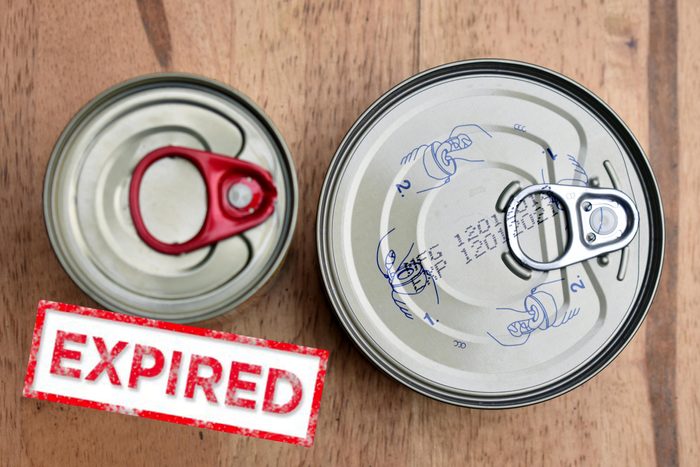
Why food expiration dates matter
Looks and smells can sometimes be deceiving (taking a whiff of the milk carton is not an exact science), which is why those expiration dates stamped on the packaging can guide you in the right direction and help prevent illness. From creamy cheeses to sandwich staples, it’s best to toss these foods once they’re past their given expiration date unless you want to roll the dice on an extra sick day.
Short on time? Check out these healthy fast food places for when you’re too busy to cook.
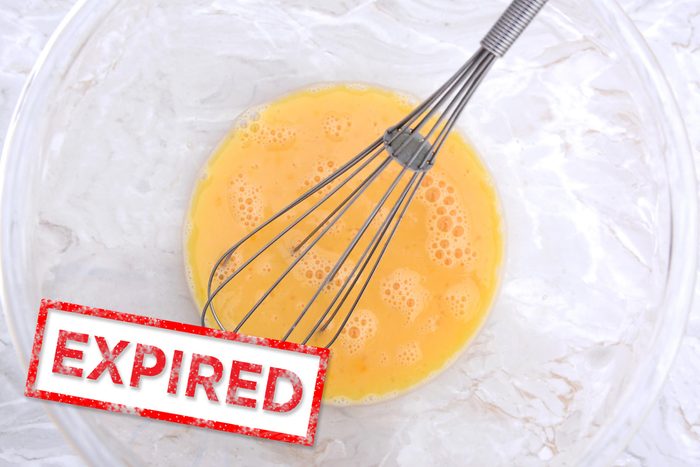
Egg substitutes
A full carton of eggs has a little more leeway than their boxed substitutes, but both should be consumed in a timely manner. If you’re debating whether to finish off that two-week-old carton of whites—don’t. “It’s very safe to keep eggs in the refrigerator for three to five weeks if they’re raw and in the shell. For egg substitute products, you have about three to five days on average once they’re open. If they’re unopened you have about 10 days,” says Jessica Crandall, a Denver-based registered dietitian, certified diabetes educator, and national spokesperson for the Academy of Nutrition and Dietetics. And just to set the record straight: yes, eggs are healthy for you.
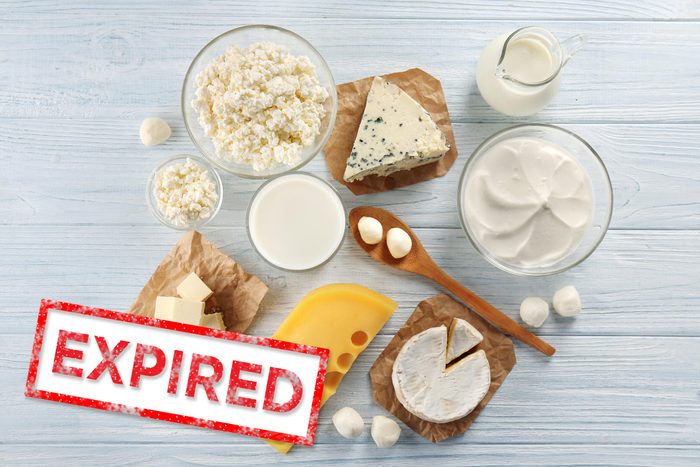
Soft cheeses
Harder cheeses like cheddar or gouda have a longer shelf life because it’s more difficult for bacteria and mold to permeate them. Once opened, hard cheeses may last up to six months in the refrigerator, according to the Academy of Nutrition and Dietetics. However, softer cheeses like ricotta, cream cheese, or goat cheese, are more susceptible to mold and bacteria and should be tossed at the first sign of spoiling or once the expiration date has passed, whichever comes first. As a general rule of thumb, softer cheeses last about one week in the refrigerator after opening.
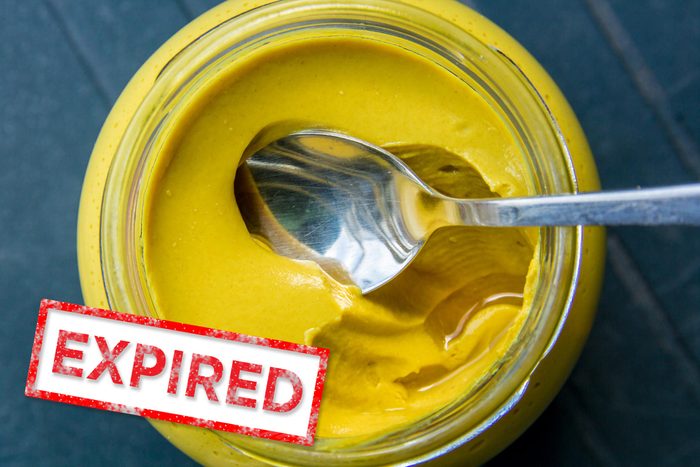
Jarred condiments
It may seem like spreads and sauces last forever, but just because they’re in a glass jar tucked away in the cool refrigerator doesn’t mean they’re untouchable by bacteria. “Once you’ve opened the lid, that safety seal is broken, and you should be using that condiment in a timely fashion,” says Crandall. “In addition, as we make sandwiches for example, we dip our knife into the spread container and wipe it onto the sandwich and then dip it back into the container. By doing this you’re putting some of that bacteria back into the container.” Jarred condiments tend to have more exposure to bacteria and therefore could lead to foodborne illness if not trashed at the appropriate time. If you notice any water floating on top, discolouration, or weird smells—just toss it. While you’re cleaning out your refrigerator, take note: these foods should never be stored together.
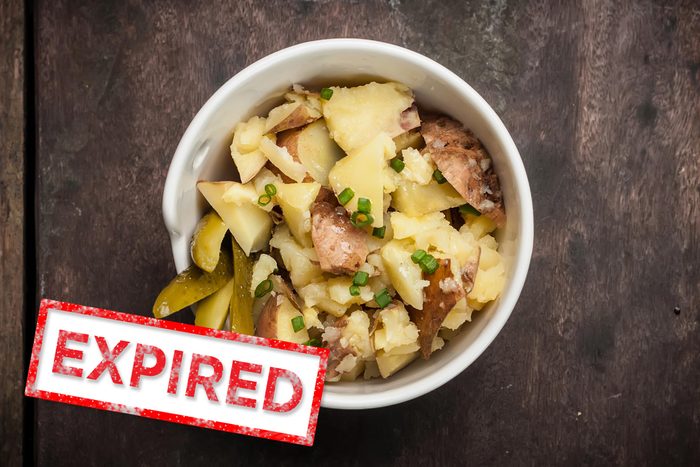
Potato salad
Similar to jarred spreads like mayo and mustard, potato or egg salads are more susceptible to bacteria growth because they have more instances of exposure. Taking a few scoops at a time from the container introduces more bacteria and increases risk of contamination leading to foodborne illness. Salads like these are often pushed to the back of the fridge and forgotten about, giving time for that bacteria to grow and for that food to spoil. “Our food system is very safe, but sometimes when things fall out of temperature or if there is bacteria introduced, we have to be extra cautious with those things,” says Crandall.
Looking to cut back on meat? Check out our beginner’s guide to plant-based eating.
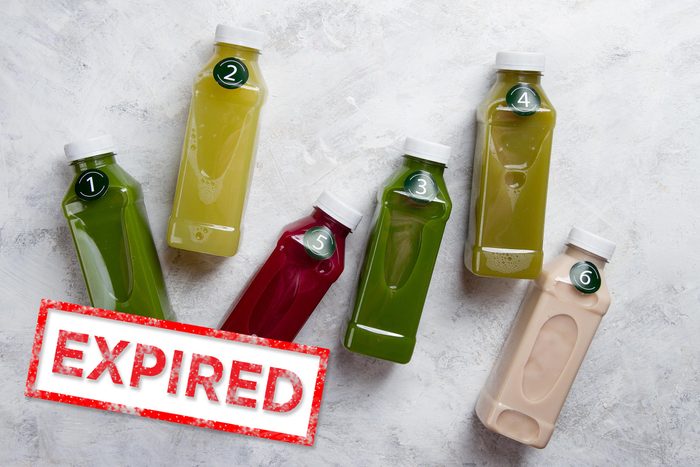
Cold-pressed juice
Green juices may be filling up your Instagram feeds daily, but they should not find a permanent home in your refrigerator. Cold-pressed or raw juices are incredibly popular among the health-conscious because they’re nutrient-dense, but it’s important to consume them very soon after buying. Unlike typical processed juices which undergo pasteurization to kill off harmful bacteria and increase shelf life, these raw juices are not pasteurized, making them much more prone to bacteria contamination. Only buy from your local juice bar what you plan to drink in the next 48-72 hours if you want to avoid getting sick. Here are 14 organic foods nutritionists don’t waste their money on.
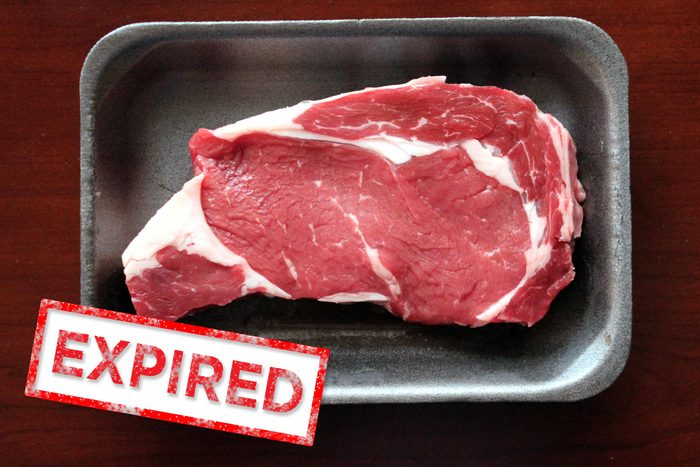
Fresh meat
With fresh meat you’re usually dealing with a “sell by” date, which tells the store the last day it can keep that product out for sale. What does this mean for you? You either need to eat it or freeze it when you get home. “The ‘sell by’ is telling the store when it should be the last day to have it on their shelf. They may even be discounting the food to try to get rid of it if it’s the last day they can have it on their shelves,” says Crandall. A lot of fresh raw meat is also contaminated with Salmonella, E. coli, or other bacteria. With that in mind, it’s very important to cook the meat at the proper temperatures as a greater defense against bacteria. Don’t miss these 13 grilling mistakes that could make you sick.
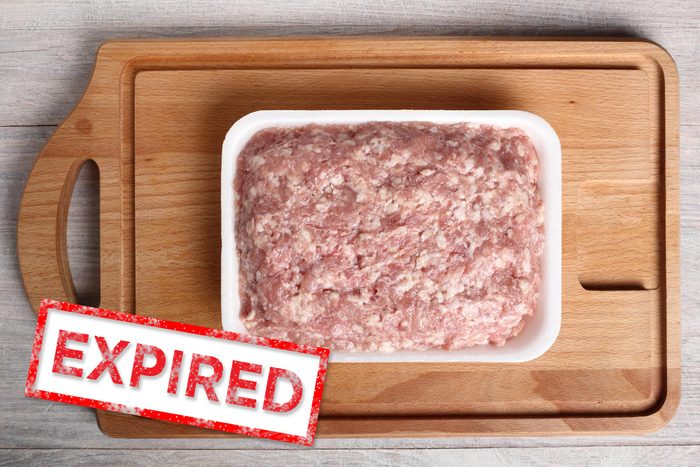
Ground meats
The FDA says that ground meat should be eaten or frozen within two days of purchase. This applies to beef, pork, turkey, lamb, and any other type of ground meat. Because it’s ground, the bacteria that were originally present on the surface can be mixed throughout the meat, increasing your risk of contracting food poisoning or another illness. Here’s what happens to your body after eating a fast food burger.

Deli meat
Take your ticket, but don’t load up too much at the deli counter. Those ham and turkey slices will only last about three to five days, so it’s important to only buy what you’ll realistically eat during that period. Prepackaged deli meats sold in air-tight packaging will last a little longer than the fresh-sliced varieties if they’re unopened, but as soon as you crack the seal you’re working with the same three- to five-day consumption window for safe eating. Deli meat in particular is susceptible to a certain kind of bacteria called Listeria, which can multiply in cold environments like your refrigerator, so just because it’s cold doesn’t mean it’s completely protected. If the deli meat is a little slimy or giving off a funky smell, then that’s a good sign it needs to go.
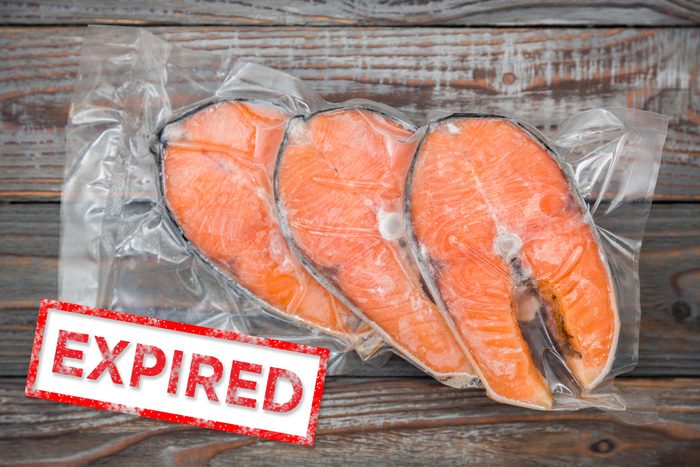
Fish
Fish are no less prone to bacteria than meat and should be consumed in one or two days after purchase. Otherwise, Whole Foods advises tightly wrapping it in moisture-proof freezer paper or foil and put in the freezer. Don’t miss these food habits nutritionists wish you’d give up.
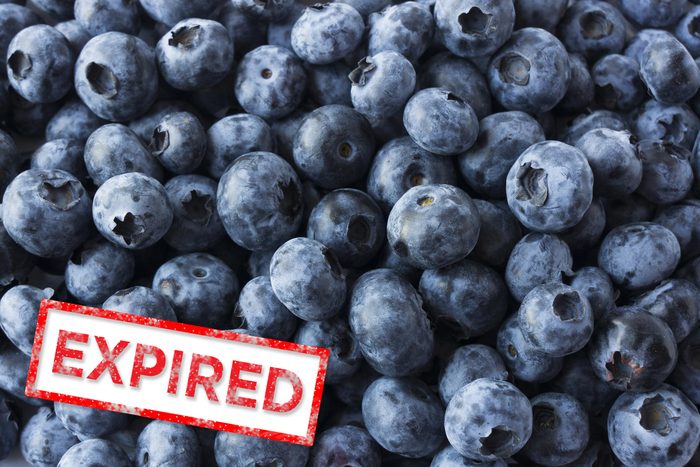
Fresh berries
Whether you get them from the store or a farmer’s market, berries have a short lifespan. Raspberries and strawberries are only good for about three days after purchase, while blueberries can last a few days longer in the fridge. Pro tip: Freeze any berries you know you won’t eat in that time frame. After that, they turn mushy and become susceptible to a bacteria called cyclospora cayetanensis, which can cause diarrhea, bloating, vomiting, and other food poisoning symptoms.
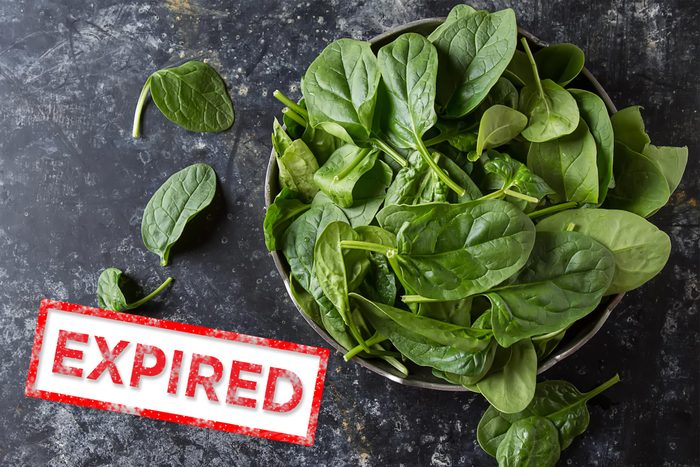
Leafy greens
Yes, even those packaged ones that are pre-washed. Prevention.com reports that these leafy greens still have the potential to carry bacteria like E. coli because they’re touched by so many hands. For your safety, wash all types of greens before eating and never consume them after any date posted on the bag. Find out which “healthy” foods nutritionists don’t touch.
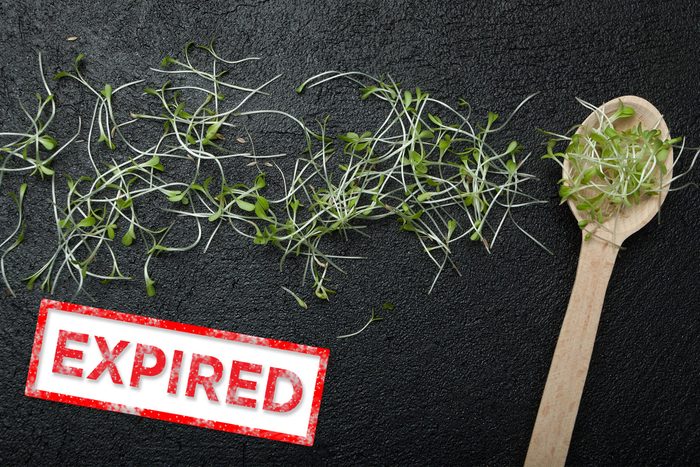
Sprouts
Sprouts are grown in warm climates, which makes them ideal breeding ground for bacteria right off the bat. Eat them past their ideal date (about two days after purchase) and your risk of getting sick increases. If you’re pregnant or already sick, avoid them altogether.
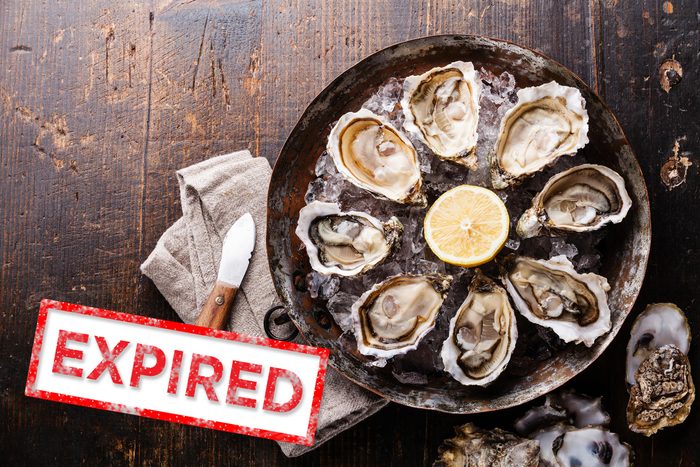
Shellfish
Like other seafood, raw shellfish can only last a day or two in the fridge before their bacteria can cause foodborne illnesses. Clams and scallops should be eaten no more than 24 hours after they are bought. Oysters eaten past their expiration date may contain vibrio vulnificus, bacteria that can cause blood poisoning. If you notice a funky odour from any seafood, throw it out immediately.
Next, check out 14 questions nutritionists get asked the most.
